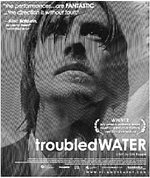Little Known Films: Troubled Waters (De USYNLIGE) 2008 NORWAY 115 mins.
This film has haunted me since I first saw it in 2010, so I felt the October issue would be the perfect time to write about it. Troubled Water sets out on a formidable task: to examine the nature of human loss and reconciliation in the wake of a Dostoevsky type tragedy. Profoundly sad and thought provoking, this meditative work is a clear triumph for humanist cinema; a true genre film that meets and exceeds the highest of expectations and is virtually guaranteed to move its audience like no other.
Released from prison after serving an eight-year sentence for the murder of a young child, Thomas returns to Oslo to arrange the scattered pieces of his life and pursue a quiet redemption. He finds employment as a church organist, settles into a small apartment and even manages an awkward but genuine courtship of Anna, the church pastor. Honest about his lack of religious faith, Thomas is nonetheless affected by the music he plays, letting the hymns wash over him with an effect at once caustic and purifying. He infuses bits of pop melody into these sacred works, the most telling refrain belonging to Simon and Garfunkel’s “Bridge over Troubled Water,” a reference to the mysterious circumstances of the waterlogged murder about which he maintains his innocence.
As Thomas grows closer to Anna, the event’s magnitude expands too, as her young son—eerily reminiscent of the boy killed all those years earlier— accompanies her ever more frequently. The tension mounts steadily, nearly overflowing when a schoolteacher recognizes the organist as the convicted murderer of her child— suddenly the painful intersection of their two lives can no longer be shuttered away in the deep recesses of memory.
Troubled Water provides interesting insights into the nature of insanity and personal guilt, and delivers a surprisingly complex look at the origins and meaning of Good and Evil both from a religious standpoint and from that of an individual who lacks faith but pursues atonement.
The film’s true power lies in director Erik Poppe’s choice to essentially switch from the narrative perspective of the perpetrator to that of the wronged party half way through the picture, resulting in a brilliant déjà vu effect that establishes two distinctly different experiences of the same events and allows us to gain deeper insight into the minds of the characters.
Poppe tried many times to get permission to use Paul Simon’s “Bridge Over Troubled Water” in the film. Simon wasn’t interested, and it wasn’t until Poppe sent two representatives to New York with a copy for Simon to screen that he finally said yes. When you see it, you will know why.
A rare screening of the film will take place at the Palisades Free Library on Saturday, Oct. 15th, at 5:00 p.m.


